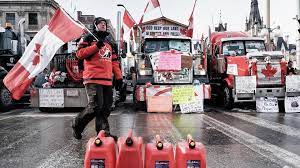
STRATEGIC ASSESSMENT. As the anti-lockdown and anti-vaccine mandate protests in Canada enter a second week, Ottawa’s Mayor Jim Watson declared a state of emergency, saying his city was under “siege” from thousands of truckers and other anti-government protesters. The mayor warned that unless law and order was restored immediately, “someone is going to get killed or seriously injured because of the irresponsible behavior” of some of the protesters. Reports of urinating on war memorials, dancing on the tomb of Canada’s unknown soldier, openly displaying Nazi paraphernalia, and other lewd and criminal behavior have flooded in as the protests drag on.
Workers at a homeless shelter were accosted as protesters demanded free meals, even allegedly shouting a racial slur at a security guard. Residents have reported hundreds of cases of harassment from protesters for something as simple as wearing a mask, in addition to noise from truck horns and noxious fumes from the trucks themselves. Truckers have parked their vehicles to block intersections, left engines idling, and generally refused to comply with lawful orders from the police. Some Canadian politicians have labeled the protests “an occupation.”
Protests took place across Canada, including in Toronto and Quebec City. Truck convoys deliberately targeted provincial legislatures in British Columbia, Saskatchewan, and Manitoba, where large gatherings of trucks blocked busy streets and snarled traffic for hours. As is often the case, the protests have grown beyond their original intent and now include a broad panoply of grievances, many of which are related to anti government extremism.
Many of the protests saw demonstrators waving American flags, indicating a sense of camaraderie with anti-lockdown and anti-mandate protesters in the United States. The protests have even been dubbed the “Freedom Convoy” by some truckers. And as terrorism finance expert Jessica Davis has pointed out, significant sums of funding have also emanated from Canada’s southern neighbor, indicated a shared sense of anti-government sentiment. Some estimates suggest that the protesters have raised more than $10 million through various platforms, including GoFundMe.
Stores and shops in impacted areas have been forced to close, adding insult to injury for those businesses that have already endured the blow dealt by the pandemic. It seems clear that some of the protesters plan to stay for a while, setting up fire pits and barbecue grills and contributing to a bizarre carnival-like atmosphere where banners are displayed denouncing Canadian politicians, the media, and calling for “Freedom over Fear,” all similar themes to anti-government protests in the United States. To date, the police have reported more than 60 active criminal investigations associated with the protests, for offenses including theft, mischief, property damage, and hate crimes. In Winnipeg, an individual was arrested after driving his car through a group of protesters, injuring four.
Canadian Prime Minister Justin Trudeau, a frequent target of protesters’ animosity, has ruled out involving Canada’s military to deal with the protestors, whom he labeled a “fringe minority.” Former U.S. President Donald Trump called Trudeau a “far left lunatic,” releasing a statement on Friday in support of the protesters. Controversial podcaster Joe Rogan and Tesla founder and billionaire Elon Mush have also voiced support for the protests.
Just as Canadian protesters have looked to emulate some of the narratives related to the January 6, 2021 Capitol Insurrection in the United States, labeling the Canadian government tyrannical, far-right elements in the U.S. have in turn coopted the protests in Canada, amplifying their messages on social media and outlets such as Fox News. The events will continue to serve as inspiration for far-right violent extremists across North America, Europe, and globally, with likely ongoing ideological, financial, and operational impacts in these transnational networks (TSC).






